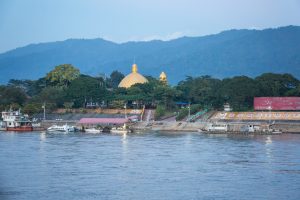The United States, United Kingdom, and Canada have imposed coordinated sanctions against 14 individuals and entities for their involvement in Southeast Asia’s monstrous online scamming industry.
According to a statement from the U.K. government on Friday, the sanctions target nine individuals and five entities for their involvement in human trafficking connected to online “scam farms” in Cambodia, Laos, and Myanmar. All of these have been responsible for supporting or benefitting from the trafficking of individuals who were forced to work as scammers and “were subject to torture, physical abuse and further cruel, inhuman and degrading treatment or punishment.”
The 14 individuals and entities included three prominent individuals connected to Shwe Kokko, a sprawling development in Myanmar’s Karen State that lies just across the border from Mae Sot, Thailand. The first was Saw Chit Thu, the leader of Myanmar junta-affiliated Karen Border Guard Force (BGF) that controls the area around Shwe Kokko. He was accompanied by She Zhijiang, the head of the Hong Kong-registered Yatai International Holding Group, which is developing Shwe Kokko along with the Karen BGF’s Chit Lin Myaing Co., whose managing director, Col. Saw Min Min Oo, was also sanctioned.
Shwe Kokko initially focused on casinos and online gambling, but like other Chinese criminal operations based in loosely regulated parts of mainland Southeast Asia, it has since diversified into telecom scams that have lured hundreds of workers, many of them from China, with promises of high-paying jobs – only to effectively enslave them upon arrival.
The scale of the industry, and the human misery that sustains it, is immense. The United Nations has cited “credible sources” to the effect that at least 120,000 people in Myanmar and at least 100,000 in Cambodia “may be held in situations where they are forced to carry out online scams.” It estimated that Southeast Asia’s scam centers “generate revenue amounting to billions of U.S. dollars” per year.
The U.S.-U.K.-Canadian sanctions also targeted Zhao Wei, a Chinese gangster-tycoon who presides over the Golden Triangle Special Economic Zone in northwest Laos, which has also reportedly become a center of scam operations. Zhao was previously sanctioned by the U.S. government for his involvement in “drug trafficking, human trafficking, money laundering, bribery, and wildlife trafficking, much of which is facilitated through the Kings Romans Casino.” The sanctions also targeted three of Zhao’s associates.
The remaining sanctions were imposed against two individuals and five entities (mostly hotels and casinos) alleged to be involved with scamming compounds in Cambodia, mostly in the coastal city of Sihanoukville and Bavet, on the country’s border with Vietnam.
The sanctions were part of a package of measures announced to mark the 75th anniversary of the signing of the Universal Declaration of Human Rights, which also included sanctions against “government-linked officials in Belarus, Haiti, Iran, and Syria complicit in repressing individual freedoms.”
In the statement, U.K. Foreign Secretary David Cameron said that his government “will not tolerate criminals and repressive regimes trampling on the fundamental rights and freedoms of ordinary people around the world.”
Given the immense scale of the scamming operations, coordinated international action is well overdue. Encouragingly, the sanctions were announced on the same day that Interpol announced the conclusion of its first operation “specifically targeting the phenomenon of human trafficking-fueled fraud.” In its statement, Interpol said that Operation Storm Makers II, which involved law enforcement agencies in 27 countries, led to the rescue of 149 human trafficking victims and the arrest of 281 individuals “for offenses such as human trafficking, passport forgery, corruption, telecommunications fraud, and sexual exploitation.”
These international efforts come amid a concerted crackdown by authorities in Myanmar and Laos, prompted by pressure from the Chinese government, which has belatedly awakened to the scale and extent of the scam operations operating to its south. This weekend, Chinese authorities issued arrest warrants for key members of the Chinese crime families in the Kokang region in eastern Shan State, who are believed to have set up massive scam compounds. Kokang, which is also run by a Border Guard Force aligned with the military, is currently under siege by resistance forces that are seeking the removal of its current leadership and the closure of its scam factories.

































